反义疑问句-感叹句-省略句 的讲解及练习题
反义疑问句详细讲解及操练(提高班用)
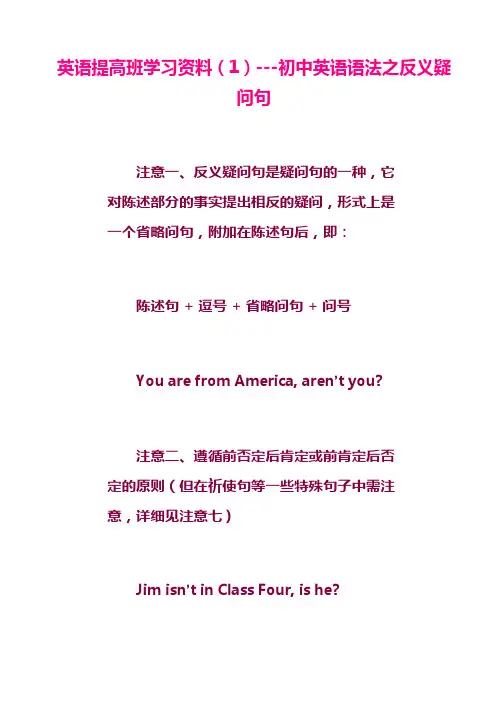
英语提高班学习资料(1)---初中英语语法之反义疑问句注意一、反义疑问句是疑问句的一种,它对陈述部分的事实提出相反的疑问,形式上是一个省略问句,附加在陈述句后,即:陈述句+逗号+省略问句+问号You are from America,aren’t you?注意二、遵循前否定后肯定或前肯定后否定的原则(但在祈使句等一些特殊句子中需注意,详细见注意七)Jim isn’t in Class Four,is he?注意三、附加疑问句必须前后两句主语相同Mr Zhang has been here for four years,h asn’t he?注意四、附加疑问句部分与主语不一致的若干情况如下(需牢记)1.this或that改it,无论是否指人This is your brother,isn’t it?2.these或those改theyThose are books,aren’t they?3.不定代词one改one或heOne can’t be always young,can one/he ?4.something、anything、everything和nothing改itNothing is serious,is it?(注意为什么后面用is it而不是isn’t it?)真的不掉线吗??、????????????Everything seems all right,doesn’t it ?5.everybody、everyone、somebody、someone、anybody、anyone、nobody改they 或he(任选,但选定后注意单复数形式)真的不掉线吗??、????????????Everyone knows this,don’t they/does n’t he?Nobody likes to lose money,does he?(这里最好用he)6.each of改he或theyEach of the boys had an apple,didn’t h e/they?7.no one,none,neither,either改they或heNo one came,did they?8.some of…、none of…改it、they或you(联系上下文或句子)None of the food was delicious,was it ?Some of the dustmen have e back,haven ’t they?9.由neither…nor…、not only…but also、both…and…、either…or…、not…but…、…or…、…and…等连接的并列主语,改复数代词Neither you nor I am wrong,are we?Both Tom and Jack came,didn’t they?10.由动词不定式、动名词、从句或词组构成的主语,改itTo learn English well isn’t easy,is i t?Swimming is great fun,isn’t it?真的不掉线吗??、????????????11.the+形容词表示一类人,改复数代词The poor had no right(权力)to speak at the time,did they?12.there引起的句子(There be句型等),仍用thereThere stands a house and a lot of tree s,doesn’t there?There are many children in the park,a ren’t there?注意五、附加疑问句部分与谓语不一致的若干情况如下(需牢记)(初中阶段14点18点和19点可以常识性了解)1.have(有)改have或doMary has two brothers,doesn’t she/has n’t she?2.have(有)必须与陈述部分一致He hasn’t a lot of time,has he?Miss Green doesn’t have any money in her pocket,does she?3.have不做“有”解释,必须用doThey all have a good time,don’t they?4.have to用do或haveWe have to get up early,don’t we/have n’t we?5.have got to用haveWe have got to answer all the questions ,haven’t we?6.had better用should或hadWe had better go right now,shouldn’t we /hadn’t we?真的不掉线吗??、????????????7.can’t(不可能,表示推测)根据can’t 或的动词选择相应的形式He can’t be a doctor,is he?The workers can’t have finished their w ork,have they?8.may用may+主语+not(英语中不用mayn’t)They may be here next week,may they not ?9.must(必须)用needn’tYou must do it today,needn’t you?10.must(应该)用mustn’tI must study hard,mustn’t I?11.mustn’t用must或mayYou mustn’t talk like that,must you?We mustn’t stay here any longer,must we ?12.“must be”对现在情况进行推测作一般现在时或现在进行时的附加疑问句进行处理2反义疑问句He must be happy,isn’t he?He must be working hard at the office,i sn’t he?must表示推测时,也有用mustn’t的He must have been working very hard,mu stn’t he?You must have told Mr Wang the secret,m ustn’t you?真的不掉线吗??、????????????13.“must+完成时”表示对过去情况的推测,作一般过去时附加疑问句处理He must have e yesterday,didn’t he?You must have seen the play last week,d idn’t you?14.“must+完成时”用来推测过去的动作持续到现在按现在完成时的附加疑问句来处理You must have studied English for year s,haven’t you?He must have lived here for at least t en years,hasn’t he?14.实义动词need和dear用doHe needs help,doesn’t he?I have never dared to ask him,have I?15.情态动词need和dear用need和dearHe dare not say so,dare he?We need not do it again,need we?16.needn’t用need或mustYou needn’t go yet,need you?He needn’t do that,must he?17.“would rather+动词原形”和“would like to+动词原形”用wouldn’tHe would rather read the text ten time s than recite it,wouldn’t he?You’d like to have some bananas,would n’t you?18.“ought to+动词原形”用oughtn’t或shouldn’t真的不掉线吗??、????????????The child ought to be punished,oughtn’t he?We ought to go there,shouldn’t we?19.“used to+动词原形”用“didn’t+主语”或“usedn’t+主语”或“used+主语+not”He used to live in London,usedn’t he/ didn’t he?He used to play football when he was a c hild,used he not?注意六、句子中有seldom,hardly,no,not,never,few,little ,nothing,nobody,nowhere等是否定句,附加疑问部分必须采用肯定形式Nobody phoned while I was out,did the y?He is hardly able to swim,is he?There is little ink in your pen,is th ere?no one,nobody,none,nothing,neither 等作动词的宾语时,附加疑问部分一般采用肯定形式(也偶尔用否定形式)He has nothing to say,does(n’t)he?You got nothing from him,did(n’t)you ?注意七、一些特殊句型的附加疑问句1.I am…改aren’t II am your friend,aren’t I?2.I wish to do sth或I wish I…改may II wish to go home,may I?I wish I were you,may I?真的不掉线吗??、????????????3.主从复合句,与主句的主谓语保持一致He says that I did it,doesn’t he?David wouldn’t go there if it rained, would he?4.并列句,与邻近的分句保持一致Mary is a nice girl,but she had one sh ort-ing,hadn’t she?5.表示邀请,请求的祈使句,附加疑问部分用will you或won’t you或would you等,一般只要记住will you就可以了,不遵循前否定后肯定或前肯定后否定的原则e here,will you?Turn off the light,will you?Do sit down,will you?6.表示告诉别人做某事的祈使句,用will you、can you、would you或can’t you、won’t youStop talking,can you?Write down the new words,will you/w on’t you?7.否定的祈使句用will you或can youDon’t make a noise,will/can you?8.Let me…用will you或may ILet me help you,may I?Let me do it,will you?9.Let’s…表示建议包括听话人在内,用shall we真的不掉线吗??、????????????Let’s go for a walk,shall we?10.let us…表示允许,不包括听话人在内,用will youLet us do it by ourselves,will you?11.Let接第三人称宾语时用will youLet him e in,will you?12.Let’s not…用OK或all rightLet’s not go to the party,OK/all rig ht?13.感叹句用一般现在时be的形式(故事中用一般过去时be的形式)What fine weather,isn’t it?How clever the boy is,isn’t he?How hard she works,isn’t she?反义疑问句练习题目:1.Linda ate nothing this morning,___?A.didn’t sheB.was sheC.did sheD.wa sn’t she2.There’s hardly___milk in the bottle ,_____there?A.no,isn’tB.some,isC.little,isn’tD.any,is3.He has never ridden a horse before,_ __?A.does heB.has heC.hasn’t heD.does n’t he4.—He seldom came here,_____?—Yes sir.真的不掉线吗??、????????????A.didn’t heB.does heC.doesn’t heD. did he5.Everything seems all right,_____?A.does itB.don’t theyC.won’t itD.d oesn’t it7.One can’t be too modest,can_____?A.oneB.heC.itD.we8.No one failed in the exam,_____?A.was heB.did oneC.did theyD.didn’t he10.Neither you nor I am a artist,_____ ?A.am IB.aren’t weC.are weD.ain’t I11.He can’t be her father,_____he?A.isB.isn’tC.canD.can’t12.They have no time to visit the museu m,_____?A.do theyB.haven’t theyC.don’t theyD.will they14.You’d better go at once,_____you?A.hadn’tB.didC.didn’tD.don’t15.You’d rather work than play,_____y ou?A.hadn’tB.wouldn’tC.didn’tD.mustn’t16.You dare not do that,_____you?A.don’tB.doC.dareD.daren’t18.He dislikes the two subjects,_____ he?A.doesB.doesn’tC.isD.isn’t19.These tools are useless now,_____ ?A.are theyB.aren’t theyC.is itD.is n’t it20.He used to get up at6:30,_____he?A.didn’t heB.did heed heD.woul dn’t he22.He ought to win the first prize,___ ____he?A.mustn’tB.oughtn’tC.shouldn’tD.B oth B and C.23.Let’s go there by bus,___?A.will youB.shall weC.don’t youD.w ill you24.Let us go to play football,___?A.will youB.shall weC.do weD.are w e25.Don’t forget to give Polly some food and change her water,___?A.will youB.shall weC.won’t youD.d o you26.—Let’s go shopping this afternoon ,_____?—All right.A.will weB.shall weC.don’t weD.are we27.—Pass me the dictionary,_____?—Yes,with pleasure.A.would youB.will youC.won’t youD. wouldn’t you30.There is little water in the glass, ____?A.isn’t thereB.isn’t itC.is itD.is there32.There won’t be any concert this Satu rday evening,_____?A.will there notB.will thereC.is th ereD.won’t33.—I guess she taught herself Japan ese,______?—Yes.A.don’t IB.did sheC.do ID.didn’t sh e34.I don’t believe you are right,_____ ?A.are youB.do youC.won’t youD.do35.She doesn’t think that Tom sings bes t in the class,_____?A.does sheB.doesn’t sheC.does heD. doesn’t he37.I know you didn’t want to hurt me,_ ____?A.did youB.didn’t youC.do ID.don’t I38.If my father were here,he would be very happy,_____?A.weren’t heB.were heC.wouldn’t he D .would heKey:1—5CDBDD6—10BACDC11—15AABA B16—20CCBBA21—25CDBAA26—30BBBAD31—35BBDAA36—38AAC真的不掉线吗??、????????????II. 形容词比较级和最高级的变化规则A. 三级的形成形容词可用来表达三种不同的程度:1. 原级用在描述与比较对象之间的性质相同。
高考英语语法复习专题(18)反义疑问句和感叹句
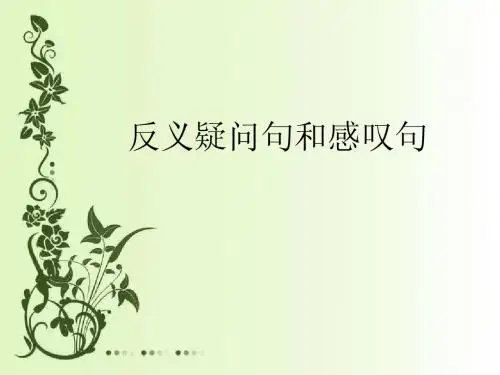
反义疑问句
Tag Question
1.主句主语为everyone, everybody, anyone, anybody, nobody , no one ,someone等时,简短 问句的主语用he /they。 • Everyone knows the rule, doesn’t he/they?
3.主句主语是there be句型时,简短问句的主 语用there • There will be a concert next Friday in our school, won’t there? • There used to be a vast of land, used not there?
• Everybody accepted the fact, didn’t he?
2.主句主语为everything, nothing, this,that等 时,简短问句的主语用it • Everything is all right, isn’t it? • Nothing could please him, could it?
4.复合疑问句的反义疑问句
• 简短问句的主语须与主句主语保持一致。若陈述 是I/we (don’t) think/ believe/ suppose/ imagine +宾 语从句,则简短问句的主语须与宾语从句的主语 保持一致,而肯定或否定形式则与主句相反。
例:It is the first time that I come here, isn’t it? I don’t think he is serious, is he?
2. how式感叹句
How+ a./adv+ S+V!
eg: How clever she is! How+ a.+ a/an + CN.单 + S+ V! eg: How strange a feeling it is!
感叹句与反义疑问句讲解与练习
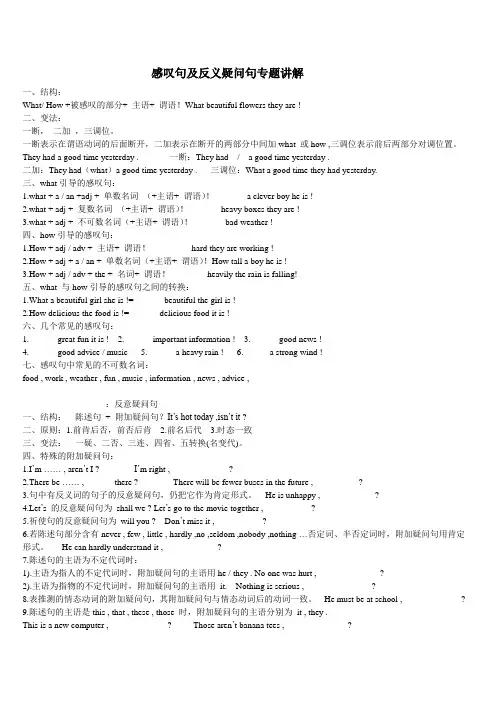
感叹句及反义疑问句专题讲解一、结构:What/ How +被感叹的部分+ 主语+ 谓语!What beautiful flowers they are !二、变法:一断,二加,三调位。
一断表示在谓语动词的后面断开,二加表示在断开的两部分中间加what 或how ,三调位表示前后两部分对调位置。
They had a good time yesterday . 一断:They had / a good time yesterday .二加:They had(what)a good time yesterday . 三调位:What a good time they had yesterday.三、what引导的感叹句:1.what + a / an +adj + 单数名词(+主语+ 谓语)!_______ a clever boy he is !2.what + adj + 复数名词(+主语+ 谓语)!_______ heavy boxes they are !3.what + adj + 不可数名词(+主语+ 谓语)!_______ bad weather !四、how引导的感叹句:1.How + adj / adv + 主语+ 谓语!_________ hard they are working !2.How + adj + a / an + 单数名词(+主语+ 谓语)!How tall a boy he is !3.How + adj / adv + the + 名词+ 谓语!________ heavily the rain is falling!五、what 与how引导的感叹句之间的转换:1.What a beautiful girl she is != ______ beautiful the girl is !2.How delicious the food is != ______ delicious food it is !六、几个常见的感叹句:1.______ great fun it is !2.______ important information !3.______ good news !4.______ good advice / music5.______ a heavy rain !6.______a strong wind !七、感叹句中常见的不可数名词:food , work , weather , fun , music , information , news , advice ,:反意疑问句一、结构:陈述句+ 附加疑问句?It’s hot today ,isn’t it ?二、原则:1.前肯后否,前否后肯 2.前名后代 3.时态一致三、变法:一疑、二否、三连、四省、五转换(名变代)。
中考英语反义疑问句、感叹句讲解及习题
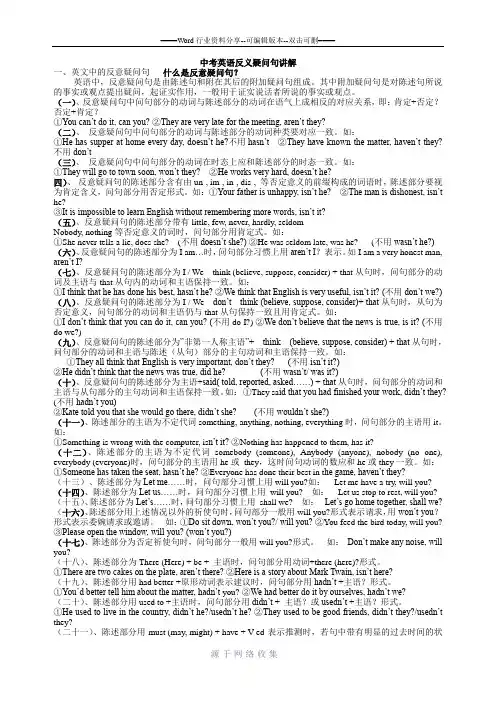
中考英语反义疑问句讲解一、英文中的反意疑问句什么是反意疑问句?英语中,反意疑问句是由陈述句和附在其后的附加疑问句组成。
其中附加疑问句是对陈述句所说的事实或观点提出疑问,起证实作用,一般用于证实说话者所说的事实或观点。
(一)、反意疑问句中问句部分的动词与陈述部分的动词在语气上成相反的对应关系,即:肯定+否定?否定+肯定?①You can’t do it, can you? ②They are very late for the meeting, aren’t they?(二)、反意疑问句中问句部分的动词与陈述部分的动词种类要对应一致。
如:①He has supper at home every day, doesn’t he?不用hasn’t②They have known the matter, haven’t they?不用don’t(三)、反意疑问句中问句部分的动词在时态上应和陈述部分的时态一致。
如:①They will go to town soon, won’t they? ②He works very hard, doesn’t he?四)、反意疑问句的陈述部分含有由un-, im-, in-, dis-, 等否定意义的前缀构成的词语时,陈述部分要视为肯定含义,问句部分用否定形式。
如:①Your father is unhappy, isn’t he? ②The man is dishonest, isn’t he?③It is impossible to learn English without remembering more words, isn’t it?(五)、反意疑问句的陈述部分带有little, few, never, hardly, seldomNobody, nothing等否定意义的词时,问句部分用肯定式。
如:①She never tells a lie, does she? (不用doesn’t she?)②He was seldom late, was he? (不用wasn’t he?) (六)、反意疑问句的陈述部分为I am…时,问句部分习惯上用aren’t I?表示。
反义疑问句详细讲解及习题及答案精编版
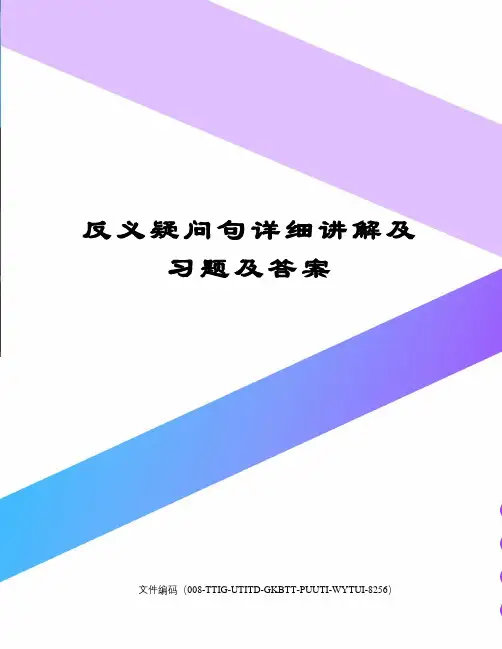
反义疑问句详细讲解及习题及答案文件编码(008-TTIG-UTITD-GKBTT-PUUTI-WYTUI-8256)反义疑问句一.句型解释反义疑问句(The Disjunctive Question):即附加疑问句。
它表示提问人的看法,没有把握,需要对方证实。
反义疑问句由两部分组成:前一部分是一个陈述句,后一部分是一个简短的疑问句,两部分的人称时态应保持一致。
1.陈述部分肯定式+疑问部分否定式2.陈述部分否定式+疑问部分肯定式She was ill yesterday, wasn’t sheYou didn’t go, did you二.特殊的句型1.祈使句。
祈使句后一般加上will you或won't you构成反意疑问句,用will you 多表示“请求”,用won't you 多表示提醒对方注意。
例如:Let引导的祈使句有两种情况:1) Let's...,后的反意疑问句用shall we或shan't we。
例如:Let's go home, shall we/ shan't we 回家吧,好吗2)Let us/me...后的反意疑问句用will you或won't you。
例如:Let me have a try, will you/won't you3)祈使句都用will you 或won’t you2.当陈述部分含I think (believe, suppose...)that... 结构时,其反意疑问句须与从句的主、谓语保持一致,注意主句的主语必须是第一人称。
例如: I don't think he will come, will he若是非第一人称,则与主句的主语相一致He thinks that she will come, doesn’t he反意疑问句的陈述部分为I(We) don’t think(believe, suppose, consider)+ that从句时,从句为否定意义,问句部分的动词和主语仍与that从句保持一致且用肯定式。
反义疑问句讲解及练习题
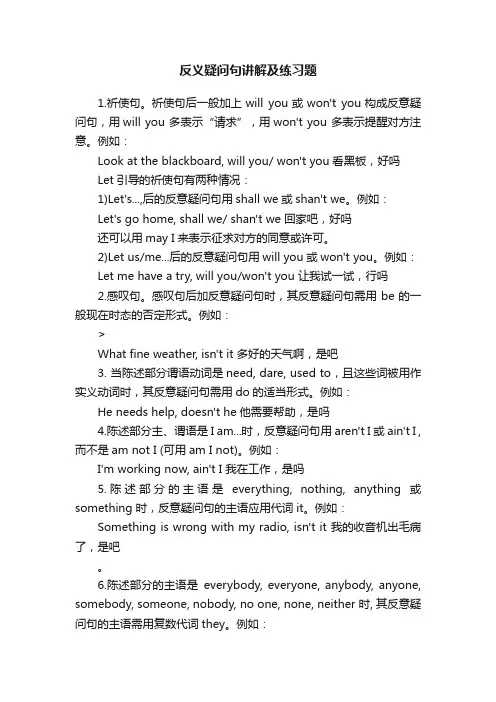
反义疑问句讲解及练习题1.祈使句。
祈使句后一般加上will you或won't you构成反意疑问句,用will you 多表示“请求”,用won't you 多表示提醒对方注意。
例如:Look at the blackboard, will you/ won't you看黑板,好吗Let引导的祈使句有两种情况:1)Let's...,后的反意疑问句用shall we或shan't we。
例如:Let's go home, shall we/ shan't we 回家吧,好吗还可以用may I来表示征求对方的同意或许可。
2)Let us/me...后的反意疑问句用will you或won't you。
例如:Let me have a try, will you/won't you 让我试一试,行吗2.感叹句。
感叹句后加反意疑问句时,其反意疑问句需用be的一般现在时态的否定形式。
例如:>What fine weather, isn't it 多好的天气啊,是吧3. 当陈述部分谓语动词是need, dare, used to,且这些词被用作实义动词时,其反意疑问句需用do的适当形式。
例如:He needs help, doesn't he他需要帮助,是吗4.陈述部分主、谓语是I am...时,反意疑问句用aren't I 或ain't I ,而不是am not I (可用am I not)。
例如:I'm working now, ain't I 我在工作,是吗5.陈述部分的主语是everything, nothing, anything或something 时,反意疑问句的主语应用代词it。
例如:Something is wrong with my radio, isn't it 我的收音机出毛病了,是吧。
高考英语一轮复习——专题十六:省略和反意疑问句及感叹句
[ 典例 ]
(2012· 新课标全国卷 )Film has a much shorter
history, especially when ________ such art forms as music and painting. A.having compared to C.compare to B.comparing to D.compared to
②—Will you join in the game? —I'd be glad to. ——你愿意参加这个比赛吗? ——我愿意。
③—Are you a sailor? —No, but I used to be. ——你是水手吗? ——不是,但我过去是。
④—He hasn't finished yet. —Well, he ought to have. ——他还没完成。 ——哦,他早该完成了。
⑥—Do you think it will rain? —I hope so/not (that it will rain/not rain). ——你认为会下雨吗? ——我希望下/不下。
[规律总结]
1.当状语从句的主语和主句的主语一致或主语是it,且 从句中含be动词时,可以省略状语从句中的主语和be动词。
2.so或not代替上文内容,此时可用“if+so/not”省略 句式。
3.I'm afraid, I think, I believe, I hope, I guess等作答 句,后面跟so与not分别表示肯定或否定,宾语从句可省去。
二、不定式的省略
①I asked him to see the film, but he didn't want to. 我叫他去看电影,但是他不想去。
反义疑问句详细讲解及操练(提高班用)
英语作文常用谚语、俗语1、A liar is not believed when he speaks the truth. 说谎者即使讲真话也没人相信。
2、A little knowledge is a dangerous thing. 一知半解,自欺欺人。
3、All rivers run into sea. 海纳百川。
4、All roads lead to Rome. 条条大路通罗马。
5、All work and no play makes Jack a dull boy. 只会用功不玩耍,聪明孩子也变傻。
6、A bad beginning makes a bad ending. 不善始者不善终。
7、Actions speak louder than words. 事实胜于雄辩。
8、A faithful friend is hard to find. 知音难觅。
9、A friend in need is a friend indeed. 患难见真情。
10、A friend is easier lost than found. 得朋友难,失朋友易。
11、A good beginning is half done. 良好的开端是成功的一半。
12、A good beginning makes a good ending. 善始者善终。
13、A good book is a good friend. 好书如挚友。
14、A good medicine tastes bitter. 良药苦口。
15、A mother's love never changes. 母爱永恒。
16、An apple a day keeps the doctor away. 一天一苹果,不用请医生。
17、A single flower does not make a spring. 一花独放不是春,百花齐放春满园。
18、A year's plan starts with spring. 一年之计在于春。
反意疑问句讲解及练习(一)
反意疑问句一.反意疑问句的定义反意疑问句(The Disjunctive Questions )是疑问句的一种,它对陈述部分的事实提出相反的疑问,反意疑问句的的构成:由一个陈述句加上一个简略形式的疑问句构成,表示说话人提出某种情况及看法,询问对方是否同意。
反意疑问句的特点:前肯后否,前否后肯(若陈述部分为肯定句,则疑问部分用否定形式,若陈述部分为否定句,则疑问部分用肯定形式)附加部分的主语须用代词,并与前句的主语一致,谓语动词在人称,数和时态上也要一致,回答时要先用Yes 或 No 做出回答,其结构为“Yes + 肯定简答”和“No +否定简答”。
He is your pen friend , isn’t he ? Yes ,he is No, he isn’t反意疑问句的类型;陈述句 + 反意附加疑问(前肯后否。
前否后肯)It's very hot today, isn't it ? Yes, it is . 今天天气很热,是不是?是的,很热。
That clock is slow ,isn't it? Yes, it is. 这钟是缓慢的,不是吗?是的,它是。
You want to get your TV set back , don't you ? Yes , I do.你想您的电视机回来,不是吗?是的,我是这样想的。
使用反意疑问句要注意以下几点一、反意疑问句中问句部分的动词与陈述部分的动词在语气上成相反的对应关系,即:肯定+否定?否定+肯定?如:①You can't do it, can you? ②They are very late for the meeting, aren't they?二、反意疑问句中问句部分的动词与陈述部分的动词种类要对应一致。
如:①He has supper at home every day, doesn't he? (不能用hasn't he?)②They have known the matter, haven't they? (不能用don't they?)三、反意疑问句中问句部分的动词在时态上应和陈述部分的时态一致。
反义疑问句-感叹句-省略句的讲解及练习题
反义疑问句-感叹句-省略句的讲解及练习题反义疑问句一.“前肯后否,前否后肯”,的形式,动词、时态等相一致,回答反义疑问句时要尊重事实。
*Your sister is not a nurse, she?No,she isn’t.she teaches English in a middle school.动词原形开头 stop talking二.祈使句的反义疑问句Don’t+动词原形Don’t talk.祈使句的反义疑问句一般都用will you,表请求。
Don’t forget to put the book back on the shelf. you?在Let’s中,则用shall we, 注:let’s 不等于let us/let me。
但表示劝诱,邀请时用won’t you;表示提醒对方用can’t you,表示告诉某人做某事。
Stop talking,can you? Have some coffee,won’t you?三.?当陈述部分主语是that/everything/something/nothing/anything等不定代词时,反义疑问句部分用it.当陈述部分主语是these/those/anyone/somebody/everybody/noone/nobody时,反义疑问部分用they,正式用he.Everything is arranged in a good order,isn’t it?四.当陈述部分是I think/suppose/believe/imagine/expect that...时,同末反义疑问句部分与宾语从句保持一致。
I don’t think he will arrive here in time,will he?五.?I wish结构中,反义疑问句部分用肯定形式may I.当陈述部分是”I am”时,反义疑问句用aren’t I. I am your student,aren’t I?但反义疑问句部分表肯定时。
- 1、下载文档前请自行甄别文档内容的完整性,平台不提供额外的编辑、内容补充、找答案等附加服务。
- 2、"仅部分预览"的文档,不可在线预览部分如存在完整性等问题,可反馈申请退款(可完整预览的文档不适用该条件!)。
- 3、如文档侵犯您的权益,请联系客服反馈,我们会尽快为您处理(人工客服工作时间:9:00-18:30)。
反义疑问句1. “前肯后否,前否后肯”,的形式,动词、时态等相一致,回答反义疑问句时要尊重事实。
*Your sister is not a nurse, she?No,she isn’t.she teaches English in a middle school.动词原形开头 stop talking 二.祈使句的反义疑问句Don’t+动词原形 Don’t talk.❶祈使句的反义疑问句一般都用will you,表请求。
Don’t forget to put the book back on the shelf. you?❷在Let’s中,则用shall we, 注:let’s 不等于let us/let me。
但表示劝诱,邀请时用won’t you;表示提醒对方用can’t you,表示告诉某人做某事。
Stop talking,can you? Have some coffee,won’t you?3. ❶当陈述部分主语是that/everything/something/nothing/anything等不定代词时,反义疑问句部分用it.❷当陈述部分主语是these/those/anyone/somebody/everybody/no one/nobody时,反义疑问部分用they,正式用he.Everything is arranged in a good order,isn’t it?4.当陈述部分是I think/suppose/believe/imagine/expect that...时,同末反义疑问句部分与宾语从句保持一致。
I don’t think he will arrive here in time,will he?5. ❶I wish结构中,反义疑问句部分用肯定形式may I.❷当陈述部分是”I am”时,反义疑问句用aren’t I. I am your student,aren’t I?但反义疑问句部分表肯定时。
可用am I. I am not your student,am I?6.在含有情态动词的反义疑问句中。
❶反义疑问句部分一般不用mayn’t,常用mightn’t或can’t代替,表将来还可用won’t. They may be here next week,mightn’t they/won’t they?❷在带有had better/would better/would sooner/would as soon/would like等句子中,反义疑问部分以had/would为助动词。
We had better go,hadn’t we?You’d rather stay here alone.wouldn’t you?❸dare和need在行为动词和情态动词中,有不同的反问.He dares to escape,doesn’t he?/He dare not escape,dare he?❹在ought to中,一般用shouldn’t. We ought to gonow,shouldn’t we?❺ must+be对现在推测,当一般时或进行时.You must be hungry,aren’t you?must+have done推测过去持续到现在,按完成体处理。
E.g:You must have studied English four years,haven’t you?must+have done表对过去推测,当做一般过去时反义疑问句处理。
E.g:You must have come last week,didn’t you?7.特殊用法❶带有推断和感叹语气的句子中。
So that’s your little game.isn’t it?表讽刺,怀疑。
❷并列复合句中,谓语动词跟临近的保持一致。
He is a professor,but his lady is an actor,isn’t she?❸陈述部分是不定式或动名词短语。
疑问部分用it. Swimming is great fun,isn’t it?❹none of+不可数名词,用it;加可数,根据情况选用they,you/are.❺陈述部分是疑问否定词的前缀或后缀构成的,其附加仍用否定。
It’s unfair,isn’t it? You are hopeless, aren’t you?附加:One can’t be too careful,can you(非正式)/can one(正式)?当陈述部分为there be时,反义疑问部分也用there.There used to be a petrol station near the park,didn’t there?反义疑问句20道题参考答案1. D2. A3. B4. D5.B6.C7.D8.D9.C 10.A 11.C 12.B13. C 14.A 15.A 16. D 17. A 18. B 19. C 20. A反义疑问句练习题1. If you don’t go, _____.A. so do IB. so will IC. nor do ID. neither shall I2. It was Mr. Smith that you met at the meeting, _________? A. wasn’t it B. was it C. did you D. didn’t you3. Listen! His family must be quarreling, ?A.mustn’t it B.aren’t they C.isn’t it D.needn’t they4. Let's take a walk, ________?A. will youB. don't weC. do weD. shall we5. You must have seen him off yesterday, _________?A. haven't youB. didn't youC. mustn't youD.needn't you6. You must be fifty, ________?A. mustn't youB. needn't youC. aren't youD.mnyn't you7. It’s a fine day, Let’s go fishing, _____?A. won’t weB. will weC. don’t weD. shall we8. Frank is working late again. This is the first time this week he’s had to study late, ____?A. isn’t heB. hasn’t itC. hasn’t heD. isn’t it9. —Daddy’s forgot to post the letter again, ____? —I’m afraid he ___.A. has; hasB. isn’t; isC. hasn’t; hasD. has; hasn’t10. —Sorry, I’m not feeling well and I don’t think I can finish.—Don’t worry. Let us do it for you , ____?A. will youB. shall weC. shan’t weD. shall you11. I don’t think he could have done such a stupid thing last night, ____?A. do IB. could heC. did heD. has he12. —The ground is wet. —It must have rained last night,____ ?A. hasn’t itB. didn’t itC. mustn’t itD. isn’t it13. —Jenny doesn’t think that Robert is honest, ___? —I’m afraid not.A. is heB. isn’t heC. does sheD. doesn’t she14. —The new windows need washing. —Well, let’s wash themtogether, ____?A. shall weB. will youC. should weD. would you15. There is little we can do about it, ____?A. is thereB. can’t weC. isn’t thereD. can we16. —The problem wasn’t difficult for him, was it ?—______. He should have been given a more difficult one.A. No, it wasB. Yes, it wasC. Yes, it wasn’tD. No, it wasn’t17. Let us take a walk, ________?A. will youB. don't weC. do weD. shall we18. Tom dislike playing tennis, ________?A. does heB.doesn’t heC.is he D isn’t he19. I don't believe he will succeed, _______? A. does he B. doesn’t he C. will he D won’t he 20. He doesn't believe he will succeed, _______? A. does he B. doesn’t he C. will he D won’t he感叹句一.由what开头: what+a(an)+adj+可数名词单数!what+adj+可数名词复数/不可数名词What fine weather it is!二.由how开头:how+adj/adv+主+谓How tall the boy is!3.特殊感叹句在陈述或疑问句后是感叹号。
E.g: Let’s go out for doing sport, sunny day! a.what b.what a c.howgreat process he has made! A.how b.what c.what a感叹句练习题答案一、1.W h a t2.What a,3.H o w,4.How5.What an,6.What,7.What a,8.What,9.How, 10.How二、BA A CA CACAC三、1.How fast 2.How exciting3.How beautiful 4.What a useful,how useful the感叹句专项练习一、填入适当的词完成下列感叹句。
